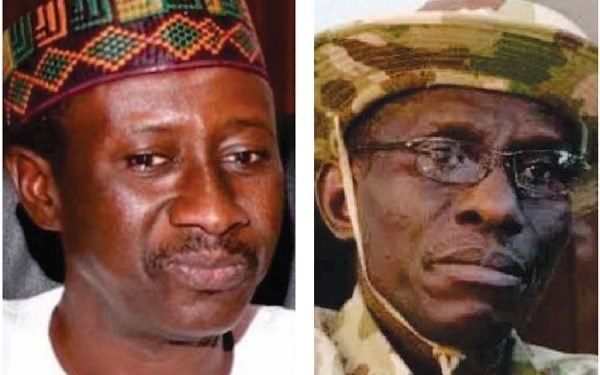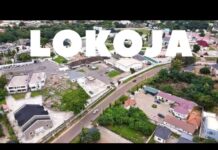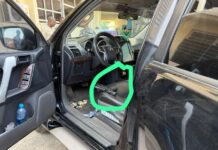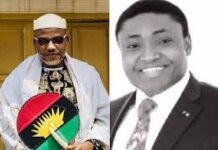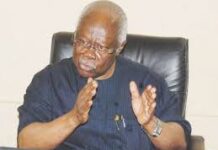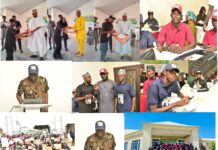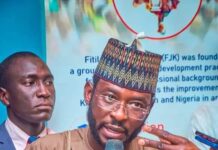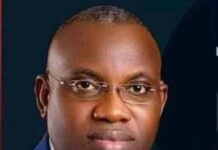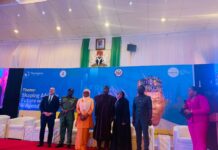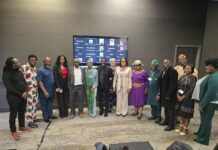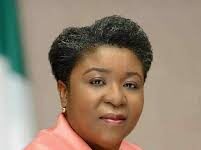Missing Weapons, Missing Funds
By Idowu Akinlotan
POLITICS DIGEST – Hours after the National Security Adviser (NSA), Babagana Monguno, alleged in an interview with the British Broadcasting Service (BBC) that the government was unable to trace and account for the $1bn taken from the excess crude account in 2018 to buy weapons during the tenure of the former service chiefs, presidential spokesman, Garba Shehu, has denied that any money was missing.
Predictably, the allegation has stirred an intense controversy, with the NSA, through the Office of the National Security Adviser (ONSA), insisting that he was quoted out of context. Even though the NSA has partially walked back his allegations, few are convinced that he didn’t know what he was talking about. So, the question remains: where is the money, and where are the weapons?
The NSA, a retired major-general, fought a war of attrition against the ex-service chiefs over chain of command and who controls whom. That war ended in a stalemate, only seemingly concluded when the former service chiefs were replaced and nominated as ambassadors. But the damage had been done, and poisoned relationships entrenched. Of course, the NSA was not suggesting that every kobo of that money was untraceable, for he knows that the A-29 Super Tucano fighter aircraft were among the purchases made by the administration. However, since his office was sidelined in many military purchases under the former service chiefs, he felt an obligation to raise queries.
It is not obvious why the NSA said he was quoted out of context. In the interview with the BBC, he was in fact very explicit, with absolutely no ambiguities of any kind. In his words: “The President has done his best by approving huge sums of money for the purchase of weapons, but the weapons were not bought, they are not here. Now, he has appointed new service chiefs, hopefully, they will devise some ways. I’m not saying the former service chiefs diverted the money, but the money is missing. We don’t know how, and nobody knows for now. I believe Mr President will investigate where the money went. I can assure you the President takes issues of this nature seriously. The fact is that preliminary investigation showed the funds are missing and the equipment is nowhere to be found. When the new service chiefs assumed office, they also said they didn’t see anything on the ground.”
Gen Monguno was reluctant to blame anyone or name names, but he was clear about what preliminary investigations revealed: that the money was missing, and military equipment missing. He did his best to hide the missing equipment he had in mind. But perhaps investigations will reveal the truth. However, that is precisely the problem. No matter how much the NSA resents the former service chiefs, and regardless of the cooperation he receives from the current service chiefs, there will be no investigations, a conclusion inferred from the clumsy manner he recanted his initial revelation on the BBC. Two reasons explain why the country is unlikely to hear more from the presidency on the matter. The first is explained by Mr Shehu’s spontaneous and unequivocal denunciation of anything suggestive of missing funds. And the second is the natural aversion the Buhari administration has for corruption allegation against the government.
If Gen Monguno was forthright in the interview, and offended by the way the former service chiefs went about arms procurement over the years, Mr Shehu was even more candid and impatient with any corruption allegation leveled against the Buhari administration. According to Mr Shehu: “About the $1bn taken from the Excess Crude Account with the consent of state governors used for military procurements, I want to assure you that nothing of that money is missing. The reference to it in the interview of the BBC Hausa Service by the National Security Adviser has been misconstrued and mistranslated. NSA made two critical points – one is that we don’t have enough weapons, which is a statement of fact; and two, procurements made have not been fully delivered. At no point did the NSA say that money has been misappropriated nor arms missing. They have not been delivered, that is correct; these are things you don’t get off the shelves.”
In the first instance, there was neither misconstrual nor mistranslation. Those who reported the story were not ignorant; nor did the recantation from the office of the NSA suggest anything other than contextual snafu. Gen Monguno was not only clear about what he had to say, he even repeated himself, perhaps unconsciously, for emphasis. He is clear that the money cannot be accounted for, at least wholly. Second, Mr Shehu was careful to emphasise that the governors, through the National Economic Council (NEC), in December 2017 sanctioned the illegal withdrawal of $1bn from the excess crude account. He said this in reference to the fact that when the withdrawal was made in 2018, it elicited bad-tempered controversy. It is true that the normally timid Nigerian governors consented to the withdrawal, but that consent did not obviate the need for legislative appropriation. The Buhari administration unconstitutionally and contemptuously avoided the National Assembly and simply took the money, believing that the NEC approval was final.
Much worse, by spontaneously concluding on behalf of the administration that the arms procurement fund was not missing, how could the government be trusted to objectively and dispassionately look into the matter in case money is actually missing? The Buhari administration is quick to accuse, prosecute and persecute others for corruption, particularly members of the opposition, but it is easily irritated and even resentful when anyone alleges corruption against members of the administration. However, no Nigerian today is convinced that corruption is not rife under this government. Gen Monguno won his battle against the former service chiefs — whether he fought them directly or not, or whether their replacement was due to pressure from him or not — but it is unlikely he can go any further in trashing them. The presidency did not wait days to respond to his allegations; they will resist any attempt, even indirectly, to tar with the brush of corruption an administration whose head they consider saintly, not to talk of scandalising military officers who seemed to have an implacable hold on the government even after their ambassadorial postings.
The National Assembly has vowed to investigate the allegation of the missing arms funds. They will be tilting at windmills. They had better conserve the little money they still have, having recently complained that they were short of funds. They have the lawful duty to investigate any alleged missing funds, and should in fact carry out such investigations as would shed light on what transpired in a Defence department so opaque and often wary of transparency that it is a miracle they can still find their way home daily. Legislative committees will, therefore, not preclude hearings, despite signals from the presidency, and they will embark on frenzied actions to unearth what they paint elegantly as the truth. But in the end, they will take dictations from the presidency, smother their zeal for legislative activism, indifferently look the public squarely in the face, and put an end to the charade. As former Jigawa State governor, Sule Lamido, said recently, the All Progressives Congress (APC) administration of President Muhammadu Buahri, apart from being divisive and bellicose, is all “confusion and crisis”.
Read Also:
The presidency should at least have pretended to distance itself from the missing funds brouhaha, while at the same time curbing Mr Shehu’s spontaneity. It is possible no money is missing, despite the national skepticism that grieves such matters; but it is also possible that money could be missing, misapplied or difficult to trace in the warrens to which it has been squirreled by malfeasant public officials. How the presidency hopes to convince the public that its hasty decision and bias would enable it to do justice, assuming it can be pressured to set up an inquiry, is hard to see. In the face of Gen Monguno’s recantation, Mr Shehu’s needless and hasty intervention, and the self-righteous and abysmal culture of the government in pursuing selective justice, Nigerians must accept that this arms fund controversy is nothing but a storm in a tea cup. It may gall them, but they have endured much worse in the six dizzying years the Buhari administration has preached change to the people without winning a single convert, except of course you count political mercenaries.
IG Adamu and tenure extension
IN his counter-affidavit and notice of objection filed against a suit by a lawyer, Maxwell Opara, before the Federal High Court in Abuja, Inspector General Mohammed Adamu argued that Section 7(6) of the Nigeria Police Act, 2020 indicates that his tenure would end in 2023 or 2024. Mr Opara and most Nigerians dismayed by police misdeeds think otherwise. The courts are expected to determine who is right. But it is curious that when the service chiefs were being replaced, and Mr Adamu was spared, the Buhari administration, through a statement by Police Affairs minister, Mohammad Dingyadi, suggested that the government needed some three months to implement a “robust and efficient process of appointing a new IG”. It is either Mr Dingyadi and the presidency were ignorant of the Police Act, 2020 or Mr Adamu is stretching the law beyond its elastic limit.
Controversial Abuja-Kano Expressway reconstruction
IN early March, the Federal Executive Council (FEC) approved N797bn for the reconstruction of the 375km Abuja-Zaria-Kaduna-Kano Expressway. Critics suggest that at that price the road would be the most expensive in the world. It is strange that the cost of the road, even if it is not the most expensive, has not confounded the federal government. The 2021 budget is about N13.6trn. In other words, the Abuja-Kano Expressway will cost just about N200bn shy of N1trn, which, as a share of the entire budget for the year, is a princely 5.87 percent.
No one can tell when the road will be completed, regardless of initial timelines, as the unending and repeatedly revised Lagos-Ibadan Expressway construction has shown. It is one of the mysteries of Nigeria that road construction is obscenely expensive and slow. Nigerians only know their beginnings; they neither know the final costs nor the completion time. The Abuja-Kano Expressway will not be any different. For a budget with a deficit of about N5.20trn (3.64 percent of GDP), just how much can the government spare for this project in this budget year? And for a country notorious for project cost revisions, would this road not eventually exceed N1trn?
Fed Govt, Delta and N2.2bn Ibori loot
IN his address during the signing of the Memorandum of Understanding (MoU) between Nigeria and the United Kingdom on the N2.2bn stolen and banked abroad by former Delta State governor, James Ibori, and associates, the Attorney General of the Federation (AGF), Abubakar Malami, spoke of deploying the recovered funds “in consonance with existing framework engaged in the management of previous recoveries”. Pursuant to this, and as agreed by both Mr Malami and the representative of the UK government, the money would be spent on the Lagos-Ibadan Expressway, Abuja-Kano Expressway, and the Second Niger Bridge. All three projects are extraneous to Delta State, thereby raising a firestorm of controversy over the propriety of applying Delta’s stolen funds to non-Delta projects.
Itse Sagay, Chairman of the Presidential Advisory Committee Against Corruption and Senior Advocate of Nigeria (SAN), argued that while a provision in the Economic and Financial Crimes Commission (EFCC) enabled such recovered loots to be ceded to the federal government, it is nevertheless unjust and devoid of common sense to spend the money on projects alien to the state from which the money was looted in the first instance. It is difficult to fault his argument. There is absolutely no basis for transferring the money elsewhere, especially when there are also federal projects in Delta needing funds. During the MoU signing, Mr Malami spoke of existing framework in order to justify what is patently unjust. But Femi Falana, a Senior Advocate of Nigeria, faulted the argument of the AGF, insisting that in fact existing framework relating to previous recoveries in the cases of Joshua Dariye, former Plateau State governor, and Diepreye Alamieyeseigha, former Bayelsa State governor, saw the federal government remitting the recovered funds to the states involved.
It is distressing that N2.2bn, a small amount in terms of the humongous funds needed to complete the three projects listed by the AGF, should dull the sense of justice of the Buhari administration and rob it of common sense. Even if there is an unfair precedent for spending recovered loots, the AGF’s decision is still indefensible, and if he possessed any sense of justice, it should have led him to revisit the past and make amends. However, both the past and the principle of justice do not support the greed of the federal government. Indeed, going by recent events in the country, especially in politics, it is clear that the Justice ministry and the attorney general’s office often adamantly scorn justice. But it is possible that Mr Malami legalistically relied on the MoU signed with the UK government to arrive at his decision. This would, however, be disingenuous. There is no way the UK government would prioritise the three projects quoted in the MoU if the AGF had not mentioned them.
Much worse, apart from the Nigerian government’s disdain for what is fair and just, is the humiliating feeling that Nigeria’s stolen money would be returned with such condescension. The import of this is that the government is weak and unable to appreciate the insult involved in being dictated to on how to prioritise and streamline its national expenditure. That Nigerian public officials transfer stolen money abroad is bad enough as an indicator of the irresponsibility of men like Messrs Ibori and Dariye; but for Nigeria to be treated as an irresponsible and profligate little child is far worse. It is true that recovered loots were sometimes looted all over again, but it is far better for national pride and national sanity to forfeit the money than to be dictated to in condescending terms. No such dictations would be countenanced by any self-respecting country. But Nigeria, of course, is not self-respecting. It constantly grovels, particularly before powerful countries.
What is even more damning and intolerable is for the AGF to fail to recognize the unfairness and injustice of deploying money stolen from Delta State to projects outside the state. It simply does not make sense. That the money is forfeited to the federal government through the EFCC Act does not mean that an administration with a sense of justice should not know where to allocate the funds. The injustice Mr Malami has engineered and excused, apart from being indefensible, is also shameful. How could he not know how to apply the N2.2bn? And what private thoughts went through the mind of the UK government representative in their estimation of Nigerians as the MoU was signed?
Source: The Nation

